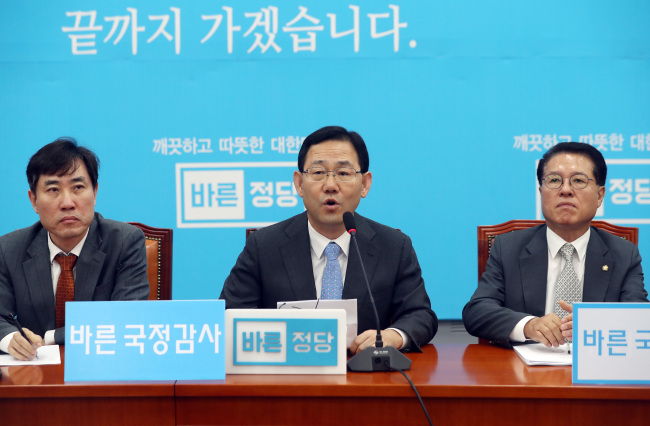Conservative Bareun Party faces divide over merger with Liberty Korea Party
By Jo He-rimPublished : Oct. 16, 2017 - 18:20
Internal discord within the minor conservative opposition Bareun Party is intensifying, as a chasm in the party deepens over the idea of a merger with the main opposition Liberty Korea Party.
While some Bareun Party lawmakers hope to establish a bilateral panel to push for the merger, others say such a move would be a fatal mistake.
At a party meeting Monday, Bareun Party members failed to reach a consensus in creating a special committee to prepare for unity within the conservatives.
While some Bareun Party lawmakers hope to establish a bilateral panel to push for the merger, others say such a move would be a fatal mistake.
At a party meeting Monday, Bareun Party members failed to reach a consensus in creating a special committee to prepare for unity within the conservatives.

“We do not know how a panel preparing for unity would be run --up to what extent of the unity the Liberty Korea party and we would be talking about,” the party’s spokesman Park Jung-ha said.
The minor opposition party was first established by some 30 lawmakers that defected from the defunct Saenuri Party. After the mass defection, the then-ruling party rebranded itself as the Liberty Korea Party, amid the massive corruption scandal which led to the ouster of former President Park Geun-hye.
At the time, the Bareun Party’s founding members criticized the Saenuri Party, which opposed Park’s impeachment, as being plagued with wrongdoings, and vowed to reform and establish “true conservatism.”
However, the party has been struggling to cement its parliamentary foothold, faced with wavering ratings and increasingly assertive liberal rivals.
The struggle for survival has created a deep divide between those who support their independence and reform of the conservatives, led by former party Chairman Yoo Seong-min and those supporting reunion with the larger conservative party. The move to return has been backed by Rep. Kim Moo-sung, once a heavyweight of the mainstream conservatives and a former ally of now arrested Park.
The Liberty Korea Party’s Chairman Hong Joon-pyo has long suggested the splinter bloc members should rejoin his party, before the minor party elects a new leader on Nov. 13.
The internal feud was also seen in a meeting on a parliamentary audit on Monday, with harsh words exchanged between members.
“I just do not understand why they are even discussing merging when it has no benefit at all,” Jin Su-hee, a member of the party’s supreme council said. “For a true merger of the conservatives, what we should do now is push the Liberty Korea Party to carry on a powerful reform.”
Jin was cut off by the party’s acting chief and Floor Leader Rep. Joo Ho-young, who is thought of as a merger supporter, as he called for lawmakers to focus on the parliamentary audit.
A party member, Gyeonggi Gov. Nam Kyung-pil, who was present at the meeting, also said the merger would only lead to their mutual destruction.
Rep. Hwang Young-cheul, who took the role of spokesman for the merger of the conservatives said they would need more time for talks.
While the both sides are trying to persuade each other, it is also possible for those supporters of the merger to defect.
Over such concerns, Rep. Hwang explained their faction would not make a group move during the parliamentary audit period which ends on Oct. 31.
“As legislators, we shall not forget our duty and will not make group moves, such as defecting the party collectively,” he said in a press briefing in the afternoon.
He also said that it is important that the “reunion” does not become a scene in which the number of Bareun Party members merely move back to the Liberty Korea Party, but that it gives the conservatives the chance to reform itself and also establish a new value to pursue.
Any defection would take away the party’s negotiation body status at the National Assembly, as at least 20 legislators are required.
If the party loses its negotiation bloc status, its political authorities would be limited and the state subsidy provided quarterly would also be reduced -- from the approximately 1.5 billion won ($1.33 million) to 500 million won.
Those maintaining the party keep its distance from the bigger conservative bloc suggest that the Bareun Party could form an alliance with the People’s Party, with which the minor conservative shares similar centric economic policies.
While the People’s Party holds a differing stance on national security issues, the party stresses the importance of multiparty system, and has been critical of the conservatives’ merger.
By Jo He-rim (herim@heraldcorp.com)


![[Exclusive] Korean military set to ban iPhones over 'security' concerns](http://res.heraldm.com/phpwas/restmb_idxmake.php?idx=644&simg=/content/image/2024/04/23/20240423050599_0.jpg&u=20240423183955)

![[Graphic News] 77% of young Koreans still financially dependent](http://res.heraldm.com/phpwas/restmb_idxmake.php?idx=644&simg=/content/image/2024/04/22/20240422050762_0.gif&u=)



![[Pressure points] Leggings in public: Fashion statement or social faux pas?](http://res.heraldm.com/phpwas/restmb_idxmake.php?idx=644&simg=/content/image/2024/04/23/20240423050669_0.jpg&u=)










